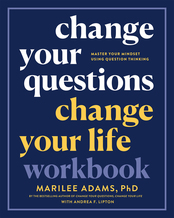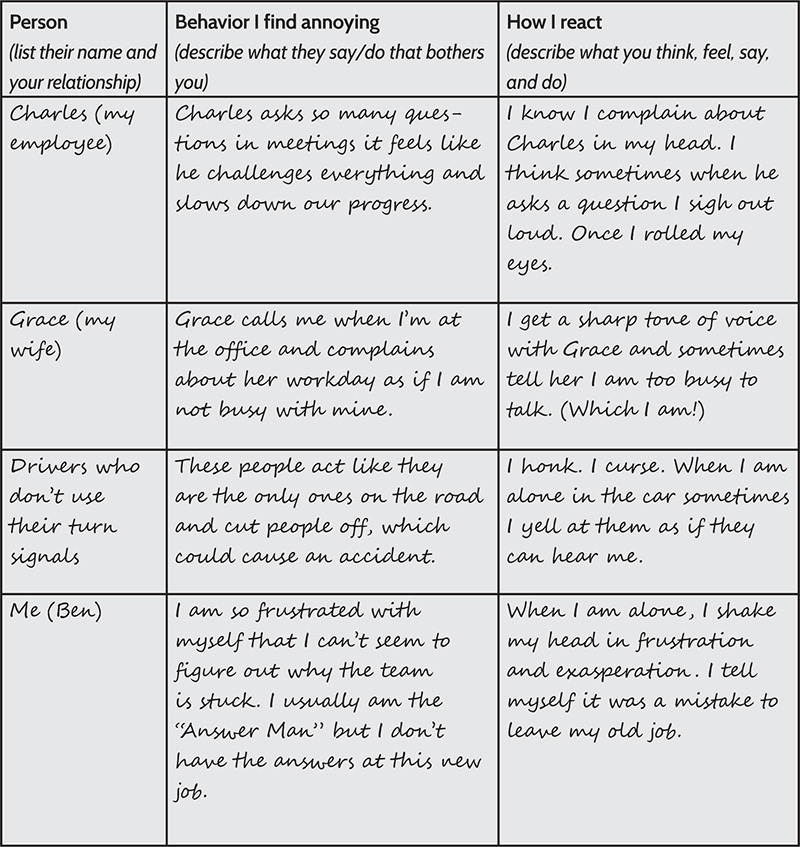CHAPTER ONE
What Do You Want to Change?
Intentional change typically involves changing mindsets, so that is where we will begin.
What Is a Mindset?
Since you picked up this workbook to master your mindset, I think it’s important to begin by defining a mindset.
Mindset is more than an attitude; it’s the place from which we operate in any given moment. It’s a way of being that influences how we think and feel, what we do, and how we relate to others and to ourselves. Mindset is always affecting our moods, experiences, behaviors, and results, and it has an impact in both our personal and professional lives.
Mindset is not static; our mindset can change from moment to moment, often as an unconscious reaction. We react to our circumstances, to our interactions with others, and even to what is happening inside us—our thoughts and feelings. Keep in mind, feelings can be either emotional or physical, which means mindset also has a somatic or bodily aspect to it. Our mindsets are not just in our heads.
What Does It Mean to Master Your Mindset?
We can change our mindset consciously and intentionally, which is what I mean when I talk about “mastering your mindset.” To do this, we must first learn to notice what mindset we are in. We do this by observing our experiences: how we react to people, situations, our own thoughts, or any form of internal or external stimuli. Mastering our mindset requires us first to learn to notice, then to slow down our automatic reactions.
Throughout the workbook, I’ll be asking you to pause regularly to reflect on the new material you are learning. Use these minibreaks to pause and jot down a few reflections on what you’ve just read.
When I was feeling stuck writing my dissertation, I paused to observe both what I was thinking and how I was thinking about my situation and myself. This process of observation was what allowed me to notice the mindset I was in and that it was related to the questions I was asking. Once I noticed my mindset, I was able to change it—to choose my questions instead of reacting automatically and unconsciously.
Once we are aware of the mindset we are in, we have choice about whether to continue operating from that mindset or to Switch to a different mindset (Figure 2). Awareness is key. The more aware we are of our mindsets, the more easily we become able to change them. In Chapter 2, we’ll explore two specific mindsets that we all share, called Learner and Judger.
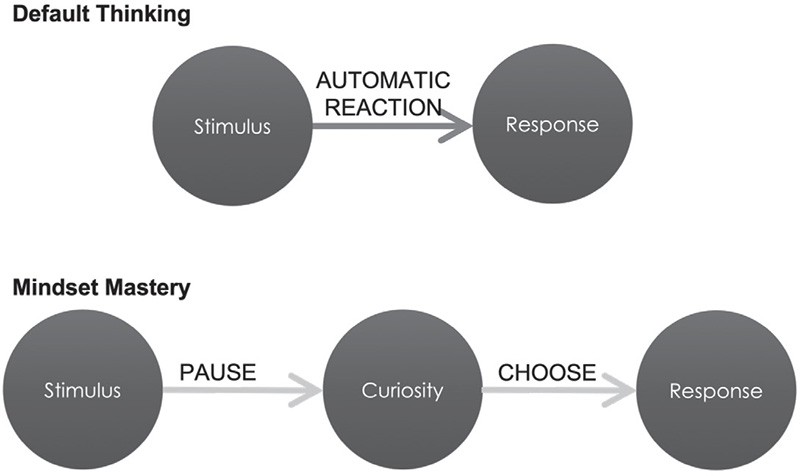
Figure 2: Default Thinking vs. Mindset Mastery
But first, let’s practice noticing our mindset by thinking about the people you know and the things they say and do that you find annoying. Yes, that’s right, we are going to think about the people we know— family, friends, colleagues, neighbors, community members—who regularly say and do things that get on our nerves.
What Gets on Your Nerves? Your Mindset Challenge
Think of some people in your life who behave in ways that bother you. When I say bother, I mean these people repeatedly say or do things that get on your nerves. You notice it, you don’t like it, and you feel uncomfortable, frustrated, or even fed up when it happens. However, it’s not a high stakes situation. Their behavior is not a relationship deal-breaker even though it gets under your skin. This annoying situation should be one that is specific to this particular person.
For example, what annoys you could be the fact that time after time your spouse or partner doesn’t replace the toilet paper when the roll is empty; your child says they are going to load the dishwasher after dinner but never does; your coworker frequently complains about their workload; or your neighbor does not pick up after their dog and leaves the mess on your lawn for you to clean up.
Pick someone or something that you find yourself reacting to. It can be purely internal, like negative commentary about the person and their behavior that runs through your mind, or it could be an external reaction like making a face, rolling your eyes, sighing loudly, crossing your arms, or making a snide comment.
To help you think about your list of people-specific irritations, let’s look at Ben’s list.
Your Mindset Challenge: What Annoys You
Now think of some people in your life who, over and over, say or do things that get on your nerves. Write down their names, what they repeatedly say or do that bothers you, and how you react.
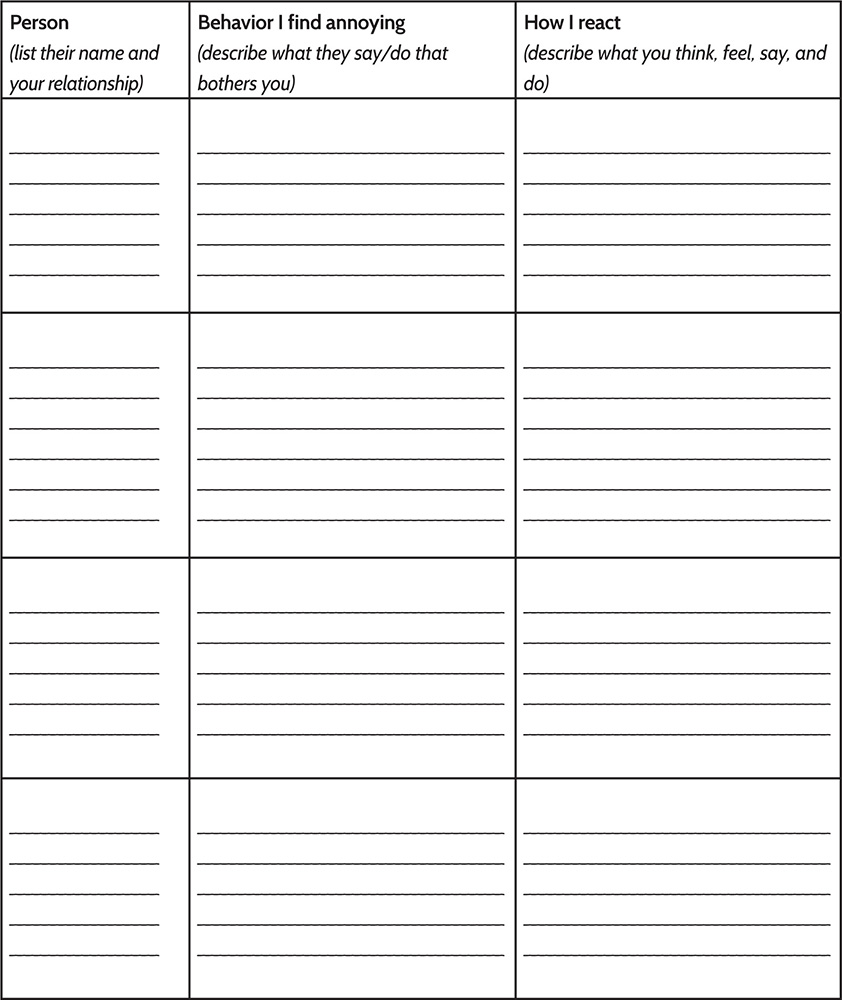
Your Mindset Challenge
In this workbook, you’ll practice mastering your mindset by completing a Mindset Challenge, which focuses on one of the people you listed and the behavior they engage in that you find annoying. You’ll learn how to change how you react when faced with this situation.
If completing this last exercise left you feeling drained or bad about yourself, take a deep breath and give yourself a break. Having negative thoughts about ourselves, others, and the world is normal and human. And that judgmental inner voice I’ve referenced can actually be a teacher if we let it. It can show us what we care about and when we are out of alignment with who we want to be.
Before you choose who and what to focus on, look at your list and ask yourself the following questions:
• Who on this list matters the most to me?
• Which of these people have I had conflicts with because of how I’ve reacted to their annoying behavior?
• Which of these relationships/situations would benefit the most if I could respond differently?
• Which of my reactions would I benefit the most from chang-ing—not just with this person but with other people and in all the places it shows up?
Based on your answers to these questions, circle two people and their behaviors that would be most valuable for you to work on. Please don’t start with a highly charged, intense situation. You’ll want to choose something important enough to provide motivation that will keep you progressing through this workbook even when it feels hard, but your relationship should not be at a crisis point. Ideally, your relationship with the person you select would have an existing foundation on which to build, despite the behavior that gets on your nerves.
To get the most out of this workbook, you want to practice mastering your mindset in relationship to an actual person in your life. That means you should not choose a group of people—like drivers who don’t use their turn signals on Ben’s list.
While we absolutely do have relationships with ourselves, and these skills can be applied to how you interact with yourself, the exercises in this workbook are designed for a situation involving another person. You’ll learn to master your mindset more effectively when you are getting the benefit of feedback from the other person. When I say “feedback from the other person” I do not mean that you will need to ask that person to give you input. But what will almost certainly happen is that your interactions with each other will change as you practice and apply Question Thinking, and that will provide useful feedback on the inner work you are doing.
For his Mindset Challenge, Ben chooses to focus on changing his reaction to Charles, the colleague he thinks asks too many questions. Also, while he doesn’t explicitly work on his relationship with Grace, Ben does see improvements in his marriage. The beauty of learning to master our mindsets with Question Thinking is that as we get skilled at using the tools in one part of our lives, the other parts usually benefit, too.
With all this coaching in mind, return to your list and choose the one person you’d like to focus on and the behavior that person engages in that you react to negatively. This will be your Mindset Challenge and the primary focus for the exercises in this workbook.
Why Do You Care about Changing?
Remember how I said to choose a person and situation you care enough about to keep you motivated when the exercises feel hard? Well now is your opportunity to connect with why changing your reaction to this person and their behavior matters to you.
Before you write down your answers, let’s look at what Ben would say about why he wants to change his reaction to Charles.
Your Mindset Challenge:
Why You Care about Changing
Think of the person you chose to focus on and the annoying thing they regularly say/do as you answer the following questions:
Who is this person to me? Why does this relationship matter?





What do they keep doing or saying that I find annoying? (Give yourself permission to complain and be specific!)






When they behave in this way, how do I react? What do I think, feel, say, and do? (Consider faces you make, how you breathe, your tone of voice, whether you get upset or shut down, etc. Be specific about your reactions; those details will serve you later.)






Why does it matter to me to change how I react to this person and their behavior?






If I don’t change how I react to this person and their behavior, what will it cost me? (For example, it might cost you a friendship or a promotion or it might simply keep draining you of joy or feeling successful at home or work.)






What Mindset Are You In? A Mindset Check-In
Now that you’ve identified the annoying person and situation you would like to focus on and explored why it is important to you, it’s time to Check-In on how you are relating to yourself and the other person.
Instructions: Read each statement. If you ever think, say, feel, or do that thing in reaction to this person and their behavior, circle “Yes.” If not, circle “No.”
Mindset Check-In: Part 1
In this situation when I am upset with or disagree with
THE OTHER PERSON…
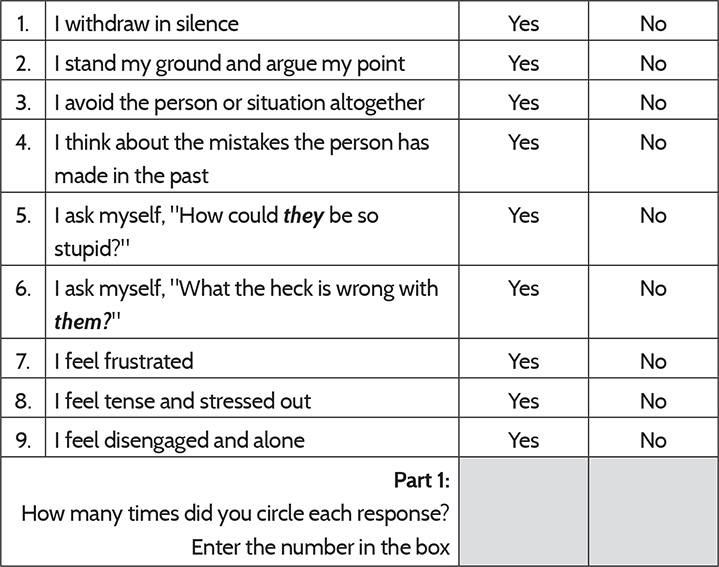
Mindset Check-In: Part 2
In this situation when I am upset with or disagree with
THE OTHER PERSON…
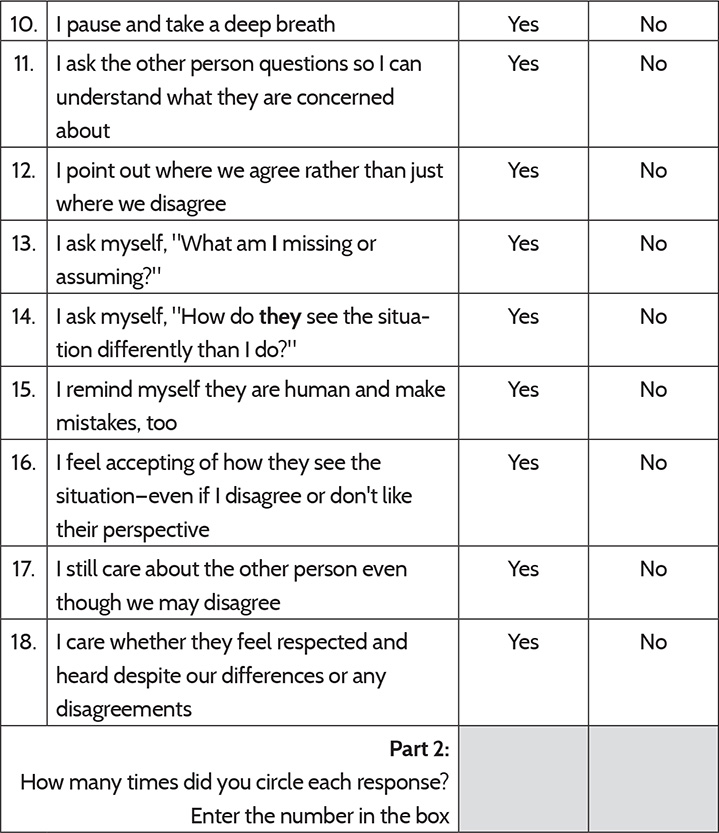
Mindset Check-In: Part 3
In this situation when I am upset with or disagree with MYSELF…
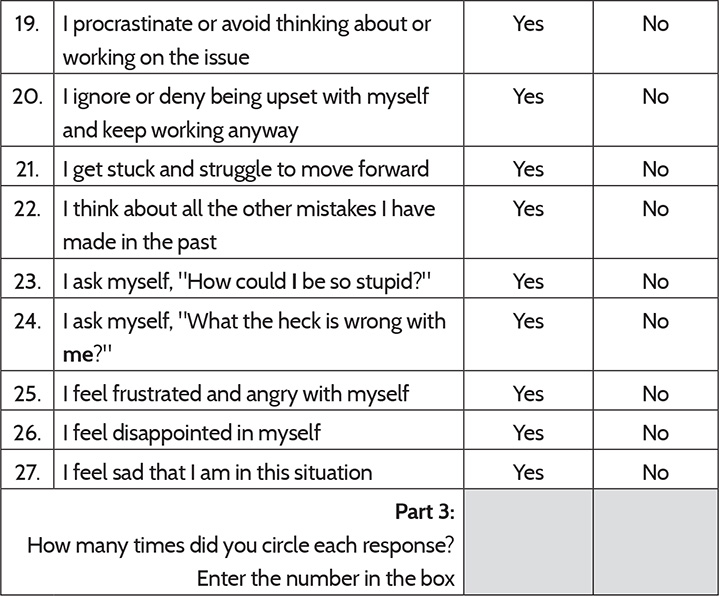
Mindset Check-In: Part 4
In this situation when I am upset with or disagree with MYSELF…
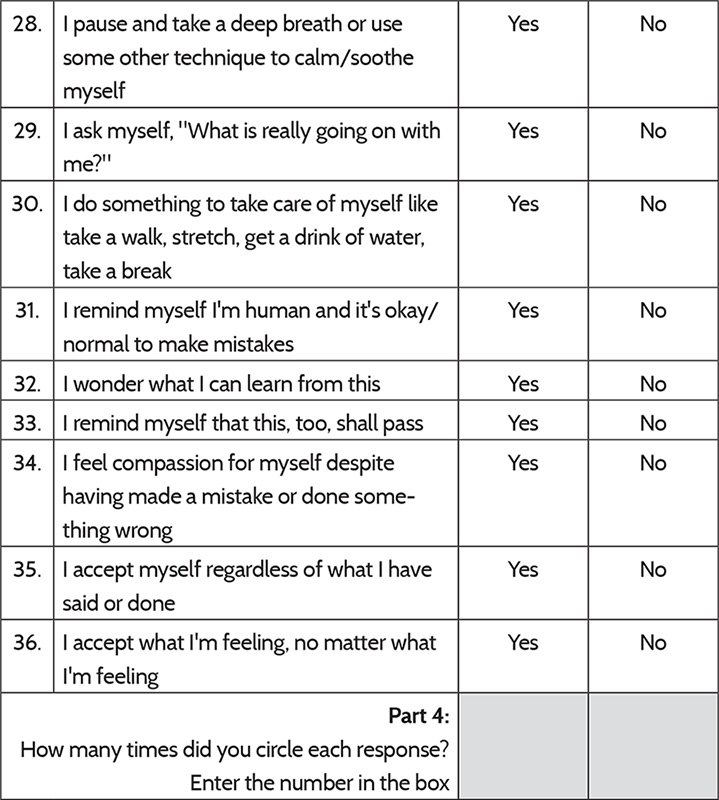
Mindset Check-In: Tabulate Your Answers
Fill in the tables that follow as instructed to create a snapshot of the mindsets you are in relative to this situation, the other person involved, and yourself.
|
Judger Mindset |
Learner Mindset |
Toward OTHER |
Part 1 YES answers
______________ |
Part 2 YES answers
______________ |
Toward SELF |
Part 3 YES answers
_____________ |
Part 4 YES answers
______________ |
TOTAL MINDSET IN THIS SITUATION |
Judger toward SELF + Judger toward OTHER
_____________ |
Learner toward SELF + Learner toward OTHER
_____________ |
We will explore Learner Mindset and Judget Mindset and what your results mean on the pages that follow.
What Are Learner Mindset and Judger Mindset?
Congratulations! You just observed your own mindsets. By answering these questions, you have experienced what it is like to notice yourself in one of the two mindsets that all humans possess: Learner and Judger. Let’s look briefly at each mindset.
Judger Mindset produces the constricting set of questions I was asking myself when I was struggling to write my dissertation; Learner Mindset produces the more expansive, energizing questions I taught myself to ask whenever I noticed a Judger Mindset question.
Both mndsets can be directed inward toward ourselves, like I was doing about my dissertation, or outward toward other people and circumstances in the world. Ben exemplified external-facing Judger when encountering drivers who don’t use their turn signals. (Confession: I have Judger thoughts and sometimes make Judger comments toward people who park on the line in parking lots.)
It’s important to remember that we all have both a Learner Mindset and a Judger Mindset—and always will. That’s because both mindsets are just normal parts of being human.
Look back at your Mindset Check-In scores. The highest you can score for either mindset is 18: nine toward self and nine toward other.
Don’t focus on whether you scored high or low for either Learner Mindset or Judger Mindset. Your scores are simply an indication, in this specific situation, of how often you notice yourself engaged in Judger or Learner behaviors. This is the beginning of raising your mindset awareness about thoughts or feelings toward yourself or the other person when faced with their annoying behavior.
A high score on either mindset does not make you a Learner person or a Judger person because there are no Learner or Judger people, no matter how it may seem. We all have both mindsets and always will. A high score does suggest that you frequently notice yourself in that mindset when you’re in this situation. Similarly, a low score on either mindset does not mean you lack the ability to be in Learner Mindset or be in Judger Mindset. It just suggests that you either don’t think, feel, or behave in ways commonly associated with that mindset or are not aware that you do.
No one can ever be all Learner or all Judger about any person or situation because we always have both mindsets. We can only be in either Learner Mindset or in Judger Mindset at any given moment. Even if the amount of time spent in one mindset makes it feel like you are all “Judger” or all “Learner” in reality, it is always possible to access both mindsets. The key question to ask yourself is whether the balance of time you spend in each mindset is supporting you in creating the relationships and results you want.






Let’s take a closer look at Learner and Judger Mindsets.
As you read the following descriptions of each mindset, consider the person, the behavior you find annoying, and how you tend to react to that behavior. Circle the words that best reflect how you are thinking, feeling, and behaving toward yourself, your circumstances, and the other person involved in your Mindset Challenge.
Judger Attributes
When in Judger mindset, we can often be…
• Closed-minded
• Certain
• Critical
• Judgmental
• Inflexible
• Isolated
• Problem-focused
• Blame-focused
• Past-focused and fear-based
Judger Relating
When in Judger mindset, we may relate to others (or ourselves) in ways that are…
• Win / lose
• Dismissive, demeaning
• Separate
• Destructive when in conflict
• Likely to go on the attack or be defensive
Judger Listening
When we listen with “Judger ears,” we tend to…
• Focus on areas of disagreement or what’s not working
• Hear things we disapprove of
• Notice what we dislike
• Fear it is “me versus them”
• Look for threats to self
• Make assumptions—and not question or test them
Learner Attributes
When in Learner mindset, we can often be…
• Open-minded
• Curious and creative
• Appreciative
• Accepting
• Flexible
• Collaborative
• Solution-focused
• Responsibility-focused
• Future-focused and possibility-focused
Learner Relating
When in Learner mindset, we may relate to others (or ourselves) in ways that are…
• Win / win
• Discerning, accepting
• Connected
• Constructive when in conflict
• Likely to appreciate, resolve, or create
Learner Listening
When we listen with “Learner ears,” we tend to…
• Focus on areas of agreement and what IS working
• Hear things we approve of
• Notice what we like
• Attempt to understand
• Assume positive intention—even if we disagree/dislike the message
• Look for the value in what is being shared
What Am I Noticing?
Let’s take a moment now to reflect on what you are noticing about the balance of your mindsets regarding the annoying person or situation chosen for your Mindset Challenge.
Your Mindset Challenge:
Things You Are Noticing about Your Mindsets
Think of your situation as you answer the following questions:
What does the score I received for Judger Mindset toward others suggest about how I am thinking, feeling, behaving, and relating to this person and their behavior?






What does the score I received for Judger Mindset toward myself suggest about how I am thinking, feeling, behaving, and relating to myself when this person behaves this way?






What does the score I received for Learner Mindset toward others suggest about how I am thinking, feeling, behaving, and relating to this person and their behavior?






What does the score I received for Learner Mindset toward myself suggest about how I am thinking, feeling, behaving, and relating to myself when this person behaves this way?






If you discovered a lot of Judger, remember it’s okay to be human! Don’t despair!
If you discovered that you are often in Judger Mindset or seldom in Learner Mindset, remember, it’s just information in this situation. Your answers are a snapshot of a moment in time, and you have the power to choose and to change. The purpose of this workbook is to help you shift the balance of time to favor Learner Mindset so you can create a new future.
Keep going!


